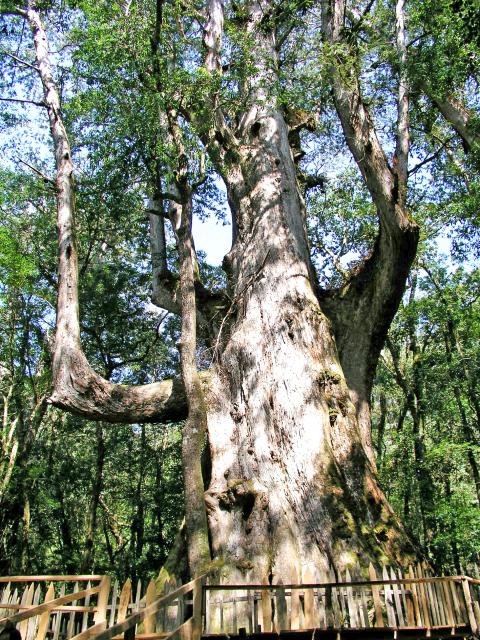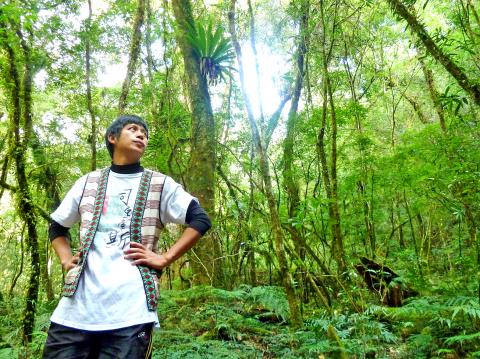Recognizing that tourism is a double-edged sword that could bring economic benefits to the Atayal community of Smangus, but could also wreak ecological damage, elders of the village in Hsinchu County’s Jianshi Township (尖石) have convened to discuss plans to limit the amount of visitors to the area to 200 to 250 per day.
According to Mu Masay, a young villager, residents hope that visitors can help the village protect the mountains and forests surrounding it, but are concerned that if too many tourists arrive, their everyday lives may be disturbed.
As the last Aboriginal village in the country to have electricity installed and be connected to the “outside” via government-built roads,” Smangus has aroused ever-rising interest as a travel destination since the discovery of large grove of ancient trees there in 1994.

Photo: Liao Hsueh-ju, Taipei Times
The rise in tourism has improved the village’s economy over time and in 2004, the government convinced 28 families — accounting for about 80 percent of the villagers — to agree to a system of “living and working together on communal land.”
Under this principle, the village has divvied up human resources into different types of work, such as labor and production, the managing of restaurants and hostels, as well as construction and agriculture, with the overall aim of sustaining its tourism industry.
Mu Masay, 29, was among the villagers who agreed with this concept.

Photo: Kan Chih-chi, Taipei Times
“The villagers worked to pave the roads because we wanted tourists to have a better path to walk on when they come to see the forest groves,” Mu Masay said.
“We carried in all of the building materials ourselves and when we the work had progressed far enough to make it inefficient to return to the village at night, we would often sleep on the ground at the work site and continue paving the next day,” he added.
Guides such as Mu Masay — of which there are about 50 — have to be ready to guide tourists into the woods and up the mountains at 6am every morning, with a round trip covering about 10km in total.
“We are also tasked with other jobs, such as preparing dinner in the evenings or cleaning up rooms in tourist lodgings to prepare it for the next customer,” Mu Masay said, adding that their workday usually ends at 10pm.
“In the off-season, we usually have one day off, but during vacations and holidays all of us work every day,” Mu Masay said, adding that their monthly pay is about NT$16,000.
During the holiday seasons, there can be up to 300 tourists staying in village lodgings, but this amount taxes Smangus’ manpower to the limit, Mu Masay said, adding that the highest number of lodgers they had received on one day was 500.
Mu Masay did not dwell too much on the low pay, adding that it was the same amount earned by villagers in other professions.
“It is our belief that our efforts will help the village develop better and in return, the village takes care of its residents, with subsidies for education, marriage, childbirth and medical needs coming from village funds,” Mu Masay said.
The only thing he expressed concern about was the maintenance of the environment.
“We have labored and sweated so that tourists can enjoy their time here, and we only hope that they appreciate our efforts and maintain our ecology and homes by not littering, or taking flowers and pieces of wood back home because they find them pretty,” Mu Masay said.
The conundrum of being reliant on tourism to benefit villagers, but constantly worried that the increasing volume of tourists will prove too stressful for the environment is an issue that Smangus hopes to solve soon.
Some non-governmental organizations have cited several programs as examples of how the village council can manage tourism in harmony with its ecological concerns.
One of the programs named as an example is the “Green Taiwan” ecological travel plan funded by the Citi Bank Taiwan Foundation and executed by the Chi Sing Eco-conservation Foundation, Under the program, Amis chefs were employed to improve the quality of the Aboriginal meals offered to tourists by the project, the organizations said.
By bettering their cooking techniques and changing key ingredients to wild herbs, the project’s meals became more expensive, but received more commendations from tourists, the organizations said.
The village council said it is mulling adjustments to lodgings, such as discontinuing four-person rooms and large rooms for groups or backpackers, and turning them into higher priced double-bed rooms. This measure would not only help control the amount of visitors, but it would also cut back on the amount of work the villagers have to do to maintain the rooms.
The village hopes to cut down the number of overnight tourists from 300 to 250 people a day over the course of five years, the council said.
The council is also considering repackaging the souvenirs it offers, which include fruit, peach wine, jam and handicrafts all made or grown in Smangus.
Villager Lahuy Icyeh said that Smangus lacks a systemic plan for the sale, packaging and marketing of its merchandise, adding however that it would continue seeking to learn what it needs to do to give visitors a better experience.

Taipei has once again made it to the top 100 in Oxford Economics’ Global Cities Index 2025 report, moving up five places from last year to 60. The annual index, which was published last month, evaluated 1,000 of the most populated metropolises based on five indices — economics, human capital, quality of life, environment and governance. New York maintained its top spot this year, placing first in the economics index thanks to the strength of its vibrant financial industry and economic stability. Taipei ranked 263rd in economics, 44th in human capital, 15th in quality of life, 284th for environment and 75th in governance,

The Sports Administration yesterday demanded an apology from the national table tennis association for barring 17-year-old Yeh Yi-tian (葉伊恬) from competing in the upcoming World Table Tennis (WTT) United States Smash tournament in Las Vegas this July. The sports agency said in a statement that the Chinese Taipei Table Tennis Association (CTTTA) must explain to the public why it withdrew Yeh from the WTT tournament in Las Vegas. The sports agency said it contacted the association to express its disapproval of the decision-making process after receiving a complaint from Yeh’s coach, Chuang

Control Yuan Secretary-General Lee Chun-yi (李俊俋) tendered his resignation last night, admitting that he had misused a government vehicle, as reported by media. His resignation was immediately accepted by the Control Yuan. In a statement explaining why he had resigned, Lee apologized for using a Control Yuan vehicle to transport his dog to a pet grooming salon on May 20. The issue first came to light late last month, when TVBS News reported that Lee had instructed his driver to take the dog to the salon. The news channel broadcast photos that it said were taken by an unnamed whistle-blower, which purportedly showed the

A former officer in China’s People’s Liberation Army (PLA) who witnessed the aftermath of the 1989 Tiananmen Square massacre has warned that Taiwan could face a similar fate if China attempts to unify the country by force. Li Xiaoming (李曉明), who was deployed to Beijing as a junior officer during the crackdown, said Taiwanese people should study the massacre carefully, because it offers a glimpse of what Beijing is willing to do to suppress dissent. “What happened in Tiananmen Square could happen in Taiwan too,” Li told CNA in a May 22 interview, ahead of the massacre’s 36th anniversary. “If Taiwanese students or